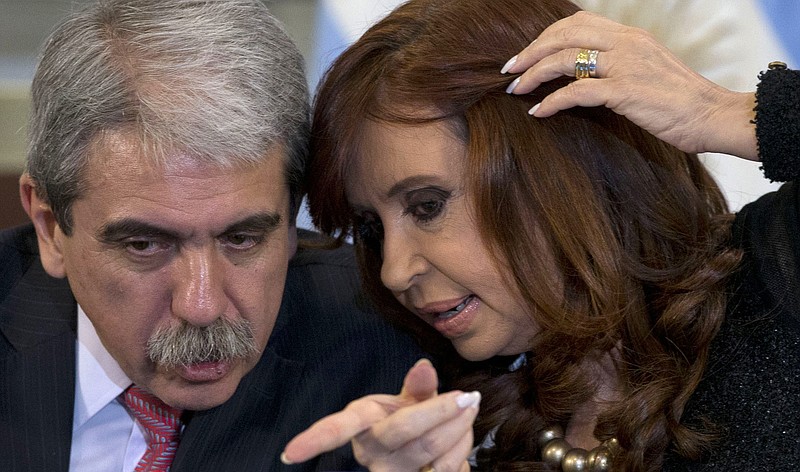BUENOS AIRES, Argentina (AP) - The corruption allegations against several top government officials are stunning: The convicted killer of three men alleges that the Cabinet chief ordered the hit, the vice president is being tried for bribery and authorities are investigating a possible money laundering scheme at a luxury hotel owned by President Cristina Fernandez.
In many nations, such alleged malfeasance would sink a party's chances in presidential elections. Not so in Argentina, where the poll leader ahead of the Oct. 25 vote, Daniel Scioli, is a stalwart of Fernandez's Justicialist Party and has largely run on its 12-year record.
The only opposition candidate campaigning on a platform of cracking down on bad-acting politicians, Sergio Massa, came in a distant third in August's open primaries.
"In this country, nobody loses sleep over corruption," said Patricio Giusto, an analyst with consulting firm Political Diagnostics.
For voters in Argentina, which has suffered periodic financial crises and has the dubious distinction of the largest default in world history, the top issues are crime and the economy. But there are other reasons Argentines shrug when it comes to political wrongdoing.
A politically charged climate, combined with a slow-moving and many argue inept justice system, makes it hard for average people to discern what's true, and easy for politicians accused of a crime to claim opponents are out to get them.
The South American nation of 41 million ranks 107 out of 174 on Transparency International's corruption perception index, scoring worse than other Latin American countries traditionally known for shady dealings, such as Mexico, Bolivia and Brazil.
"Corruption is inherent in the culture," said Sergio Rojas, a 26-year-old who said he has not yet decided who he will vote for. Rojas added that Argentines often reconcile the problem by saying to themselves, "they are all thieves, so we have to vote for whoever robs the least."
A recent poll by the Center for Study of Public Opinion, a Buenos Aires-based think tank, found that voters' top issue was crime, closely followed by inflation and the economy. Corruption was a distant fourth.
When asked about the administration's scandals during a recent interview with The Associated Press, Scioli said the accusations were an indication that the opposition lacked good ideas.
Opposition candidates "are planting seeds of pessimism and discontent in Argentines, who don't want to go back but rather want to move forward," said Scioli, the governor of the Buenos Aires province and a former vice president.
And the leading opposition candidate, outgoing Buenos Aires mayor Mauricio Macri, has had to confront his own corruption scandal in recent weeks. A congressional candidate in his alliance, Fernando Niembro, withdrew from his race amid an investigation into no-bid contacts he was awarded by the city. The scandal had little impact, however, with polls showing at most a 1 percent drop in Macri's support.
On the campaign trail, Macri promises to overhaul the monetary system and attract foreign investment to improve the economy.
While many voters are frustrated by slow job growth and inflation that private economists estimate at around 30 percent, the economy isn't nearly as bad as after the 2001 default, when millions of Argentines were plunged into poverty.
"That helps make sure the scandals don't impact the mood of the electorate," said Mariel Fornoni, director of consulting firm Management & Fit.
Massa, the other main opposition candidate, has tried to gain traction with an anti-corruption message. The former Fernandez loyalist, who broke with the administration to form his own party, has proposed eliminating the statutes of limitation on crimes by former politicians.
"I'm going to put all of them (corrupt politicians) in jail," he says in a commercial.
If polls are any indication, Massa may not get the chance.
About 40.6 percent of the electorate supports Scioli, compared to 29.4 percent for Macri and 18.1 for Massa, according a poll by consulting firm Aresco. The poll, conducted Sept. 8-9, interviewed 4,165 people and had a 1.55 percent margin of error.
For voters, it's difficult to distinguish fact from fiction in a climate where accusations abound and trust is lacking - in both politicians and news outlets, which many Argentines say are allied to particular parties.
During an August jailhouse interview with the Clarin Group, Martin Lanatta, convicted of killing three men allegedly connected to an ephedrine ring, said Cabinet chief Anibal Fernandez was behind the hit but provided no details.
Fernandez said the accusations were politically motivated. Clarin has long been at odds with the administration and the accusations were made days before he ran in the primaries for governor of the Buenos Aires province.
The money-laundering probe involving Hotesur, a firm owned by the president to manage her family's hotels, is also murky.
Hotesur's headquarters were raided late last year and again in July amid an investigation into whether the firm had failed to pay taxes on Fernandez's hotels. The investigation has evolved to focus on whether Alto Calafate, a signature hotel in Patagonia, has been used by the Fernandez family and business associates to launder money. Administration officials claim the investigation is politically motivated.
Even when a corruption case has a more solid legal backing, such as the bribery and influence peddling charges against Vice President Amado Boudou, it rarely reverberates. Boudou's indictment, based on accusations when he was economy minister in 2010, was upheld on appeal earlier this year and the case is set to go to trial.
Throughout it all, Boudou has continued in his post while denying the allegations.
"I don't know who I'm going to vote for," said Alejandra Castro, a 39-year-old clerical worker in downtown Buenos Aires. "Everybody's hands are dirty."
